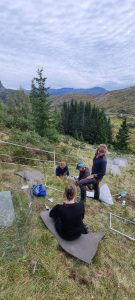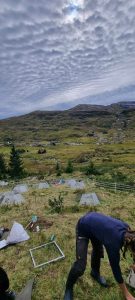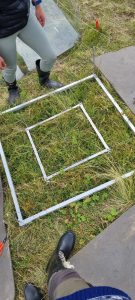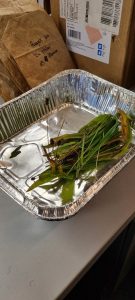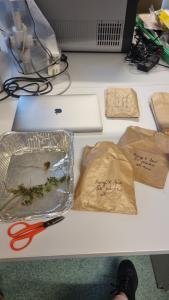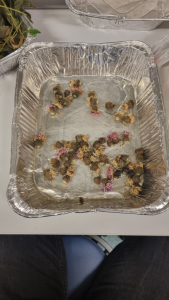Exploring Plant Adaptation in the Face of Climate Change
This semester, I had the chance to work on a project that explores how plants might adapt to climate change. As temperatures rise, some plants could move upward in elevation and alter their characteristics to survive in new environments. The RangeX research group, which leads this work, is studying ten potentially range-expanding lowland plant species planted in experimental plots at different elevations near Voss. The main goal of this research is to study how temperature and competition affect the traits of these plants, which may help determine which species and traits are favorable and more adaptable in a changing climate, which could tell us something about the future of alpine ecosystems. My part of the project focused on four of these species, looking at how they allocate their mass into different plant parts to adapt to their environment, specifically into leaves, stems, and flowers. I only participated in one day of fieldwork to collect plant biomass, but most of my time was spent in the lab processing the collected samples.
Lab Work: Time-Consuming But Somewhat Relaxing
I spent almost 100 hours in the lab, where I, along with another intern, separated the plants into leaves, stems, and flowers, dried the samples in a drying oven, and then weighed the samples and recorded the mass into a datasheet. The lab work was not particularly challenging, but very time-consuming! Some of the samples were very large and could take over an hour to sort into the different plant parts. The nice thing about spending so much time in the lab was that I could listen to music or podcasts as I was working, which was a nice way to relax my head from all the other work I had to do this semester.
Changing Paths: From Molecular Biology to Plants
I took this course to help me figure out what to focus on for my master’s project and to gain more experience with practical work like fieldwork, lab techniques, and working independently. When I first started thinking about my master’s project, I wanted to go into molecular biology since cell processes and genetics fascinate me. However, as part of the integrated master’s teaching program, I realized that molecular biology might require more time than I could afford since I am already way behind schedule for finishing my degree. Typically, my program includes a 30-ECTS master’s thesis, but molecular biology projects often need 60 ECTS because of the time it takes to do experiments and gather data. At this stage in my degree, I felt it was best to focus on finishing within the standard 30 ECTS. Plants seemed more interesting than fish (which is a big focus at UiB), and the RangeX group offered a perfect opportunity to try something new. This project has helped me see if plant research is something I’d like to pursue further.
Takeaways and What’s Next
I have enjoyed meeting people in the RangeX group and others working on plant projects in the same building. There’s a great sense of community, and it’s inspiring to be surrounded by people passionate about their work. While I haven’t settled on my exact master’s project yet, this experience has made me want to continue with plant research. It’s given me valuable skills such as working independently in the lab, coordinating with a supervisor, and managing my time in a flexible course format. These are all things I know will be essential for my master’s project and beyond.
